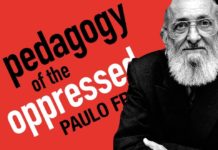Disclaimer: The Eqbal Ahmad Centre for Public Education (EACPE) encourages critical and independent thinking and believes in a free expression of one’s opinion. However, the views expressed in contributed articles are solely those of their respective authors and do not necessarily reflect the position or policy of the EACPE.
Hardly anyone, bar some Islamists extremists, would feel offended by the statement that the Islamic world is lacking in progress. Our education, innovation, growth, and freedom levels are all worse compared to other religions. And this gloomy fact is made all the worse when one considers that Islam is the second biggest religion in the world. Why, despite there being so many Muslims, do we rarely ever see a Muslim winning the Nobel Prize or starting a multi-million dollar company? Why are hardly any of our modern technologies developed by a Muslim? Why is the literacy rate of Muslim majority countries so low?
While the answers to all these questions are different, they share a common basis. It all started from 9th century AD with the writings of Al-Ash’ari, an underrated but consequential figure in Muslim theology. He founded the Ash’arite theology, or Ash’arism. This was and is one of the most important schools in Sunni Islam. It is also, however, one of the most irrational. But it is not correct to call it irrational, for reason is merely a mirage according to Al-Ash’ari. Reason does not exist. Only revelation does.
In Pakistan, Bangladesh, the emphasis is always on rote memorizing facts—not reasoning. Of course, modern Muslims (not all) aren’t so skeptical of reasoning, but the traces of this mentality can be traced back to Al-Ash’ari’s writings.
Ash’arism has a multitude of outrageous tenets, such as God need not be just—justice doesn’t apply to God, for God is transcendent and no stricture can be imposed on him—but it this aspect of Ash’arism—that of rejecting reason—that takes the cake. This tenet of Ash’arism led to the downfall of the Muslim world and Islamic theology. In fact, no such thing as theology exists according to Al-Ash’ari. Remember, there’s no reason, only revelation. We mortals can not possibly reason or interpret laws in Islam (ijtihad) because that is sheer shirk. We are not Gods. Assuming there exists a God other than Allah is the biggest crime in Islam, deserving of a classic beheading. So yes, there is no theology, and if there is then theologians can’t use reason. They can only recite revelation.
This, right here, gives birth to the ascendancy of rote memorization in Muslim education. In Pakistan, Bangladesh, the emphasis is always on rote memorizing facts—not reasoning. Of course, modern Muslims (not all) aren’t so skeptical of reasoning, but the traces of this mentality can be traced back to Al-Ash’ari’s writings.
Speaking of Al-Ash’ari’s writings, the ironic thing is while he was busy demeaning philosophers, he did so using reason. He is not citing revelation or Quran (except in some cases) while refuting philosophers, particularly Aristotle. No, he uses reason. Same goes for Al-Ghazli, the subsequent proponent of Ash’arism. He is considered one of the most important Muslims, and for good reason: he was the one who embraced Sufism, mysticism, and spread Ash’arism beyond Arab world through his writings. His dogmatic skepticism of the senses and reason as a means to obtain knowledge prevailed throughout his writings. But he too used reason to refute reason. For instance, he refuted Aristotle’s claim that the universe is eternally existing by arguing there must be a first cause otherwise only God isn’t transcendent but the universe is too. He utilizes reason to de-utilze reason.
The writings of these two men and the consequent triumph of Ash’arism fettered the Muslim world unlike anything else. Ash’arism argues every moment is a miracle; every natural thing you see is being dictated by God to be what it is or to do what it is doing at this very moment (occasionalism). So nothing follows a natural law; all is merely being dictated by God’s whim. The fact that you turn on the tap and the water flows is not because of the way the water infrastructure is set up or because H2O flows; rather, it is God that decides that very moment to flow the water. The fact that the leaves are moving in the wind is not because of the wind or because of the weight of the leaves, but merely because God decides to move the leaves. No natural law, hence nothing is to be discovered. There is no science and there is no reason. There is only revelation and hence only rote memorization of facts. To say otherwise is to assume supremacy not granted to humans but only belongs to God. To say otherwise is to commit shirk and be killed. No wonder barely anyone says otherwise.
About the Author:
Fasih Zulfiqar is an IBA undergrad and aspiring economist from Karachi. He can be reached via his blog Pakonomist.







